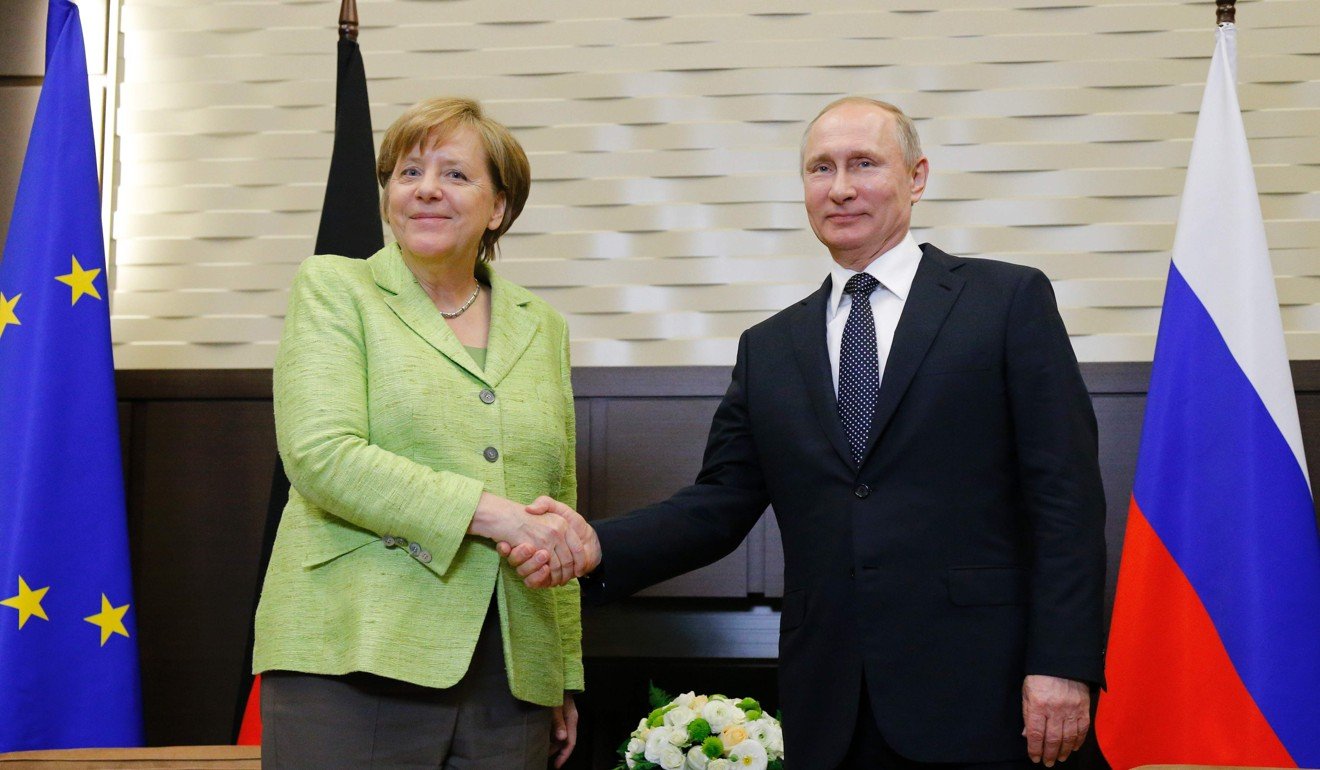
Analysis | That time Putin terrified Merkel with his dog, and other reasons they won’t get along at G20 summit
It’s a story to strike fear in the hearts of non-dog lovers everywhere: renowned tough guy and cute-animal cuddler Vladimir Putin once brought his pet Labrador, Konnie, to a meeting with German Chancellor Angela Merkel.
Merkel has a famous and deathly fear of dogs. She has since childhood. The incident took place at the Russian president’s Sochi residence on the Black Sea in 2007.
The meeting underscores a strained political relationship that will be tested anew when the two leaders take part in the G20 summit July 7-8 in Hamburg that US President Donald Trump also will attend.

“It always used to be said in Germany that Russia is a friend. Today, we say that not only is it not a friend, it is increasingly not a partner. But it is still a neighbour, and that’s the world we live in,” said Michael Broening, a policy analyst in Berlin at Friedrich-Ebert-Stiftung, a political foundation.
“When you look at the catalogue of problems that disunite Germany from Russia these days it really is a long, long list.”
Despite those differences, Merkel and Putin have a bond based on her upbringing in East Germany, which had been under Soviet control until Germany was reunified and the Soviet Union dissolved a generation ago. Putin still laments the 1991 break-up.
Another link: Merkel speaks Russian and loves Russian literature, while Putin speaks German and has a daughter who was born in Germany, where Putin spent five years as a KGB intelligence officer.
Putin has since apologised for bringing Konnie to the meeting with Merkel. He claimed he wasn’t aware of the chancellor’s fear of dogs, although Broening said Germans assumed Putin must have been briefed ahead of time about Merkel’s dog phobia.
Photos of the encounter show Merkel looking anxious as the hefty black Labrador sniffs her then settles near her feet. Putin looks their way and flashes a mischievous grin.
“The dog does not bother you, does she? She’s a friendly dog and I’m sure she will behave herself,” Putin told her.
“No, she doesn’t eat journalists after all,” Merkel replied.
Konnie died in 2014. Putin has two other dogs.
Putin features regularly in staged photographs where he can be seen feeding a young elk, frolicking with Bulgarian shepherd dogs in the snow or holding fluffy kittens while comforting victims of natural disasters. He also burnishes his macho credentials by releasing images and video of himself assisting in polar bear research, hunting Siberian tigers or riding horses – sometimes bare-chested – across remote Russian tundra.

Merkel, by all accounts, rarely leaves the house for breaks. She likes baking and making potato soup. A few years ago, she broke her hip while cross-country skiing.
Stefan Kornelius, who spent years covering Merkel as a journalist and who has written an authorised biography of her, calls Merkel and Putin “perhaps the oddest political couple of modern times”.
“They are about the same age [Merkel is 62, Putin is 64]. Both were born in the former Eastern bloc. Both gained their basic political experience at the time when the wall came down in Germany [1989],” Kornelius said.
“However, she turned basically West, and he turned East. Putin hung onto the old system and idolised the strength of the Soviet state. He deplored the collapse of the Soviet Union, whereas Merkel openly embraced the West and the United States and everything that gave us liberal democracy.”
Kornelius said that even as she moved in different political directions, Merkel felt she could deal with Putin until Russia annexed Ukraine’s Crimean Peninsula in 2014 and the Russian president emphatically denied that he was providing military support for separatists in Ukraine despite clear evidence of Russian help.
“Over the past few years that has now hardened into a conviction that Putin can no longer be trusted,” he said.
The feeling may be mutual. Merkel supports EU sanctions against Russia for its intervention in Ukraine, and Germany is a loyal member of Nato, the western military alliance that Putin resents for enlisting former Russian allies.
For Putin, Merkel now represents “everything that is wrong with the global liberal order,” Broening said.

